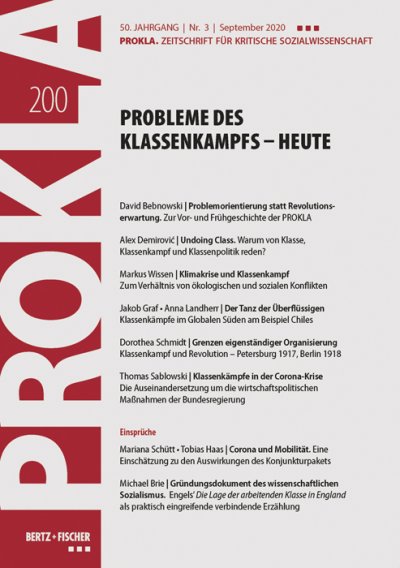Limits of autonomous organization
Class struggle and revolution – Petersburg 1917, Berlin 1918
DOI:
https://doi.org/10.32387/prokla.v50i200.1894Keywords:
Russian Revolution of 1917, German Revolution of 1918, class struggle, workers’ and soldiers’ councilsAbstract
Analyzed from a socio-historical rather than a political perspective, the events of the Russian Revolution of October 1917 and the German Revolution of 1918 point to the underlying class conflicts. The late industrialization of Russia was accompanied by continual repression. This class struggle from above resulted in spontaneous organizing at the level of factories and in the radicalization of class struggle from below. Whereas in Russia there existed a lack of opportunities to organize, the German social democrats and trade unions were eminently successful in this respect. This led to the »party truce policy« from 1914 on and to the shut down of class conflict at the expense of workers.
Downloads
References
Albert, Gleb J. (2017): Labour Movements, Trade Unions and Strikes (Russian Empire). In: Daniel, Ute u.a. (Hg.): 1914-1918 online. International Encyclopedia of the First World War – FU Berlin. DOI: https://www.doi.org/10.15463/ie1418.10458.
Anweiler, Oskar (1958): Die Rätebewegung in Russland 1905-1921. Leiden.
bpb, Bundeszentrale für politische Bildung (2012): Streiks, Aussperrungen und »kampflose Bewegungen«. URL: https://www.bpb.de/, Zugriff: 23.5.2020.
BSB, Bayerische Staatsbibliothek München (2011): Dekret über die Aufhebung der Stände und der staatsbürgerlichen Rangbezeichnungen, 11. (24.) November 1917 – 100(0) Schlüsseldokumente zur russischen und sowjetischen Geschichte. URL: http://digitale-sammlungen.de/, Zugriff: 23.5.2020.
Cheremukhin, Anton / Golosov, Mikhail / Guriev, Sergej/Tsyvinski, Aleh (2014): The Industrialisation and Economic Development of Russia through the Lens of a Neoclassical Growth Model, https://www.brown.edu/, Zugriff: 23.5.2020.
Henning, Friedrich-Wilhelm (1993): Die Industrialisierung in Deutschland 1800 bis 1914.
Paderborn.
Hildermeier, Manfred (1989): Die russische Revolution 1905-1921. Frankfurt/M.
– (1990): Arbeiterschaft und politische Radikalisierung in der russischen Revolution 1905-1917. In: Geschichte und Gesellschaft 16(4): 512-535.
Käppner, Joachim (2017): Aufstand für die Freiheit – die Revolution der Besonnenen. München.
Kautsky, Karl (1907): Das Erfurter Programm – In seinem grundsätzlichen Theil. Stuttgart.
Lehnert, Detlef (1983): Sozialdemokratie – Zwischen Protestbewegung und Regierungspartei. Frankfurt/M.
Llewellyn, Jennifer / McConnell, Michael / Thompson, Steve (2019a): Russian Industrialisation. URL: https://alphahistory.com/, Zugriff: 23.5.2020.
– (2019b): The Lena River Massacre. URL: https://alphahistory.com/, Zugriff: 23.5.2020.
Melancon, Michael (2014a): Labour (Russian Empire). In: Daniel, Ute u.a. (Hg.): 1914-1918 online. International Encyclopedia of the First World War – FU Berlin. DOI: https://www.doi.org/10.15463/ie1418.10031.
– (2014b): Social Conflict and Control, Protest and Repression (Russian Empire). In: Daniel, Ute u.a. (Hg.): 1914-1918 online. International Encyclopedia of the First World War – FU Berlin. DOI: https://www.doi.org/10.15463/ie1418.10308.
Mironov, Boris N. (2010): Wages and Prices in Imperial Russia, 1703-1913. In: The Russian Review 69(1): 47-72. DOI: https://doi.org/10.1111/j.1467-9434.2010.00554.x.
Peeling, Siobhan (2014): War Industry Committees. In: Daniel, Ute u.a.: 1914-1918 online. International Encyclopedia of the First World War – FU Berlin. DOI: https://doi.org/10.15463/ie1418.10251.
Puttkamer, Joachim von (1996): Fabrikgesetzgebung in Russland vor 1905: Regierung und Unternehmerschaft beim Ausgleich ihrer Interessen in einer vorkonstitutionellen Ordnung. Köln.
Reed, John (1975): Zehn Tage, die die Welt erschütterten. Berlin.
Rieber, Alfred D. (1982): Merchants and Entrepreneurs in imperial Russia. Chapel Hill.
Rotermundt, Rainer (1977): Oktoberrevolution und Sozialismus – Zur Bedeutung des Massenbewusstseins für die Herausbildung nichtkapitalistischer Produktionsverhältnisse. In: PROKLA 27 (7)2: 77-102. DOI: https://doi.org/10.32387/prokla.v7i27.1696.
Schmidt, Dorothea (1999). Zurück zur Jahrhundertwende? Alte und neue Selbständigkeit in Deutschland. In: PROKLA 117 29(4): 603-626. DOI: https://doi.org/10.32387/prokla.v29i117.799.
Schneider, Michael (1989): Kleine Geschichte der Gewerkschaften – Ihre Entwicklung in Deutschland von den Anfängen bis heute. Bonn.
Smith, Stephen A. (2017): Revolution in Russland – Das Zarenreich in der Krise 1890-1928. Darmstadt.
Strautmann, Tobias (2014): Die positiven Folgen des Krimkriegs. In: Tagesanzeiger, 24.3.2014.
Teuteberg, Hans Jürgen (1961): Geschichte der industriellen Mitbestimmung in Deutschland. Tübingen.
Thatcher, Ian D. (2005a): Introduction. In: Ders. (Hg.): Late imperial Russia: problems and prospects. Manchester: 1-8.
– (2005b): Late imperial urban workers. In: Ders. (Hg.) Late imperial Russia: problems and prospects. Manchester: 101-119.
Tugan-Baranowsky, Michail (1900): Geschichte der russischen Fabrik. Berlin.
Ullmann, Peter (1977): Tarifverträge und Tarifpolitik in Deutschland bis 1914. Frankfurt/M.
Wehler, Hans-Ulrich (1995): Deutsche Gesellschaftsgeschichte 1849-1914. München.






